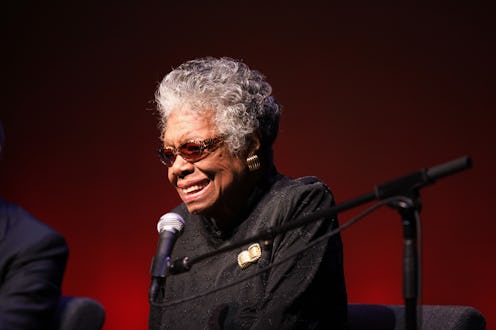Entertainment
7 Women Writers Who Deserve The Movie Treatment
Hollywood loves the writer. There is no kind of individual more likely to stand as the beacon of idolatry in a feature film than a great novelist or poet. And yes, we can draw the obvious conclusion that this communal adulation is only the consequence of the fact that it is writers themselves bringing these stories to screen. But be it an act of occupational narcissism or not, audiences love a good tale about a wordsmith too. Think of how many times you’ve seen a swashbuckling Ernest Hemingway tearing through set pieces, or veiled portraits of famous recluse J.D. Salinger. This summer, we see Infinite Jest author David Foster Wallace — practically a mystical figure in the minds and hearts of Generation X and the Millennials — brought to life in The End of the Tour. And while each of these men has a fascinating yarn to spin, we wonder where all the movies about great female authors have been hiding.
Sure, we’ve seen a few: Sylvia Plath’s tragic depression got the big screen treatment in Sylvia starring Gwyneth Paltrow, and the romantic follies of Jane Austen fueled Anne Hathaway’s Becoming Jane. But so many great women, purveyors of some of the best works of literature we know today, remain wanting for the same honor bestowed to Joyce, Dickens, twice to Capote, and so many times to Shakespeare. Here are a few that I'm calling for in the near future:
1. Maya Angelou
Angelou has written, appeared in, and had had her work showcased in films, but is in dire need of an illustration of her life and creative aspirations. There are almost too many possible avenues for proper articulation of Angelou’s story, with intrigue lying in her early days as a nightclub dancer and sex worker as well as in her later years as a civil rights leader.
2. Flannery O'Connor
Perhaps more strongly associated with the tenets and sentiment of Catholicism than any modern writer, O’Connor was a living testament to the influence of religion and spirituality on a person’s worldview and creative conquests. The bleak but inviting tone of O’Connor’s bibliography warrants just as a bleak an invitation into the personal pains that inspired such harsh work.
3. Mary Shelley
In addition to concocting one of the most famous monsters in Western lore, Shelley was also a travel writer, a biographer, an essayist, and a writer in a number of other media. It might be even more fascinating to learn about her globetrotting adventures or her chronicles of the most eminent literary and scientific men she could find than to delve into the imaginings behind her development of Frankenstein, though either one would be a treat.
4. Ayn Rand
Yeah, she might be a loon with a questionable code of ethics, but Rand is no doubt a figure worthy of examination. For the Atlas Shrugged and Fountainhead author, you need not even delve into the world outside her own mind. A taut character piece, unraveling the psychology of one of the most radical conservative thinkers of the 20th century would be fascinating enough to fuel a drama, thriller, or even a horror movie. (And no, the 1999 TV movie The Passion of Ayn Rand doesn’t suffice, even if it did star Helen Mirren.)
5. Zora Neale Hurston
Anthropologist and novelist Hurston wrote vividly about the experiences of being a black woman living in a nation of intolerance. From her upbringing in the all-black neighborhood of Eatonville, Florida to her attendance of Barnard College as its sole black student, Hurston’s life experiences are an unquestionably fruitful field for social study.
6. Gertrude Stein
Claiming contributions to the modern lexicon like “a rose is a rose is a rose” and “there was no there there,” Stein is without a doubt the kind of intellectual powerhouse without whom we’d be a different people. Openly gay in an era hardly accommodating of such a lifestyle, Stein was as much a pinnacle of courage as she was of creativity. Perhaps the most fascinating chapter of the novelist’s colorful life was her tenure at 27 rue de Fleurus in Paris, where she and her brother ran a communal house for creative giants of the age. We saw glimpses of this conceit in Woody Allen’s Midnight in Paris , though perspective lay with visitor Owen Wilson and patron Hemingway. Stein’s experiences as the housemaster deserves focus all her own.
7. J.K. Rowling
Of course we cannot limit our sights to past eras. Plenty of contemporary authors have rich accounts all their own; Harry Potter creator J.K. Rowling, for instance, is famous for having grown up poor, thinking of her magical storybook series while observing a field of cows, and standing up for progressive ideals in her adult years. We've spent so much time getting to know Harry on the big screen and those books; don't we want to better get to know the woman who brought him to life in the first place?
None of this is to take away from The End Of The Tour. I'm just saying next time, why don't we direct our attention towards some of these ladies who are literary legends in their own rights?
